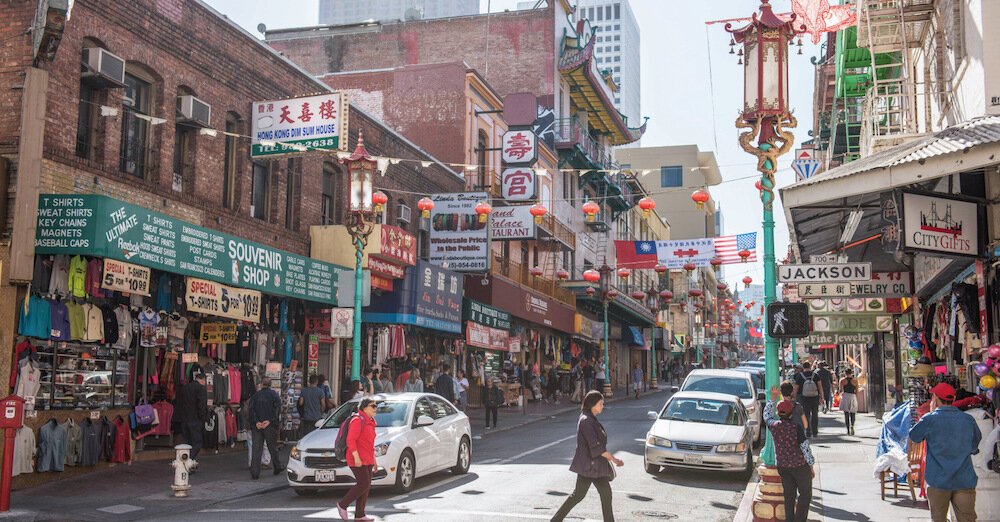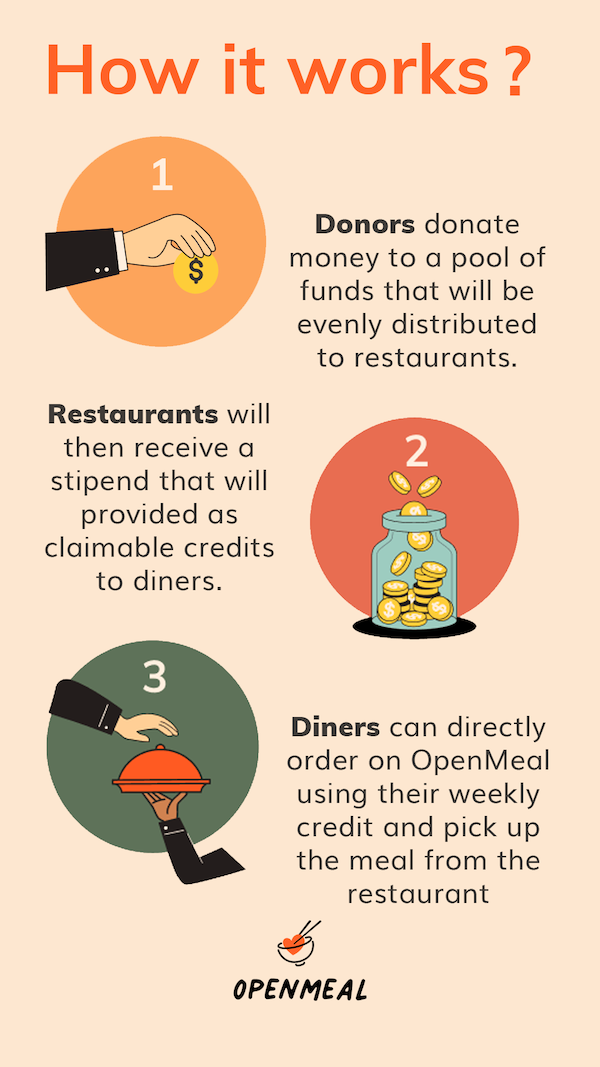OpenMeal: Empowering Local Restaurants While Helping Communities Affected by COVID-19
Guest article by Amy Zhou
How a 22-year-old Asian American created an online app to feed low-income families by buying meals from restaurants threatened by closure
From bustling tourism to a sudden decrease in business, popular Asian American restaurants are now suffering the repercussions of COVID-19. As early as April 15, over 50% of family-owned Asian restaurants had been forced to close their doors [1]. And in a 3-month time span (March-June), 2,120 cases of hate crimes against Asian-Americans related to COVID-19 were perpetrated [2]. Every day, restaurants are presented with new challenges - the rise of Anti-Asian xenophobia, restaurant dining restrictions, and economic strains of the pandemic, all compounded upon one another. In addition, food banks are seeing longer lines and increased demands, as 1.2 million Americans have filed for unemployment since March.
Jeson Lee, a 22-year-old Malaysian immigrant, decided he couldn’t watch his community continue to struggle. As a full-time product manager in Silicon Valley, he knew he could utilize his expertise in building technical programs to solve problems. He teamed up with a group of Asian American engineers and designers to create OpenMeal, an online nonprofit platform that provides meals to anyone who is hungry by buying food from small restaurants facing closure. With one donation, a hungry individual is fed and business is brought back to a family-owned restaurant facing closure.
San Francisco Chinatown community
Before building OpenMeal, Jeson had to test the market interest for it. He began by posting in Facebook groups and Reddit threads about his idea, and reaching out to local restaurants in Chinatown to learn about their experience. To his surprise, a dozen restaurant owners quickly expressed interest. Restaurant owners shared that they not only saw OpenMeal as an opportunity to gain more business, but to serve their community that needed it the most. On the other hand, many blue-collar workers, single mothers, university students, and recently laid off workers shared that even having an extra meal each week would greatly relieve their financial stress. It was clear to Jeson that there was a position for OpenMeal in the nonprofit industry. Finding the market demand was the easy part, the challenge became developing a minimal viable product that worked.
Design that's intuitive and reliable without constant support
Jeson and his team quickly learned that when it comes to building the first MVP, they simply needed an app that was intuitive to learn, and most importantly, actually worked. “Before our MVP launch, we were certain that we wanted to build a 3-sided platform of donors, diners, and restaurants such that we can assist two of the most COVID-impacted communities” Jeson explains. “When we onboarded restaurants and diners for our first MVP beta test, we received requests from restaurants to shift our UX so that it was easy to learn. For this reason, our MVP was built to be lean and limited to our core features - an MVP should really just be barebones. We then shifted our design from creating seemingly ‘cool’ apps and features, to instead just be intuitive and reliable without our constant support.”
Not only did they need to take into account human-centered designs, the engineering team also had to determine their tech stack. OpenMeal’s team decided to use React, as it offers a great framework to build new and custom web apps from scratch. It is also extremely popular among Frontend engineers, making it easier to onboard new engineers onto the team. Jeson also noted that they introduced Tailwind CSS as part of the redesigning process. “Tailwind is a CSS framework with predefined custom CSS classes for developers to customize their frontend component UIs. Since our designs are all custom, it made sense to use Tailwind CSS to build out our own custom reusable component library. It’s one of the newest and awesomest CSS frameworks today!”
Apart from the tech stack, Jeson takes pride in the work culture he’s established at OpenMeal. “We operate similarly to a startup. Our teams collaborate through daily standup for 1+ hours, weekly syncs and asynchronous messaging through Slack to align consumer needs, UX goals, and design specifications to the engineering team.” Like a startup, the team must find a smooth process to communicate across different stakeholders and teams. The marketing team must translate market needs so that designers can create a UX that addresses user pain points. Then, designers must communicate to the engineering team to build these features from scratch.
“Communication between all the different stakeholders in the tech, design, and marketing team becomes a challenge as we can only communicate online and with different time zones, but a passionate and transparent team is what drives OpenMeal to the success it is today!” says Jeson.
Grant Place Restaurant, San Francisco
“OpenMeal helps me know that we won't be hungry. I don't have to stress about paying bills or skipping payments so I can have food money. I don't feel embarrassed like when I would go to the food pantry or a food distribution place. I get to feel like a human again.” –L.J., OpenMeal Diner
“Thank you OpenMeal for giving us a chance to not only feed the community but an opportunity to give our staff dignity through work.” –Billy, Owner of Grant Place Restaurant in San Francisco
OpenMeal was created to ensure that anyone could enjoy a delicious restaurant-cooked meal…
which is why Jeson chose to call meal recipients ‘diners’. “Everyone deserves a delicious meal to look forward to, no matter what their situation is,” he explains. “Our OpenMeal members are not just food requesters, recipients, or the needy. They are esteemed ‘diners’ who deserve a delicious restaurant meal like the rest of us.”
“A diner can apply to OpenMeal and receive a meal in their hands all within hours,” Jeson explains. Their technology-driven solution allows it to scale to any city, restaurant, and diner with just a few clicks. Using technology also allowed them to keep their operational costs at a minimum. Currently, OpenMeal only takes 3% of donations to run costs, while most charities spend an average of 20% on overhead costs.
After establishing strong roots in the Asian-American community, OpenMeal is expanding their reach and impact quickly. From San Francisco and Los Angeles to Dallas and New York, OpenMeal has over 2000 meals claimed and brought business back to 25 family-owned restaurants of all cuisines and cultures.
So what’s next? OpenMeal has plans to expand to the rest of the country, bringing hope to every restaurant and diner in need.
You can read Jeson’s story here.
[1] Coronavirus' toll on Chinese restaurants is devastating
[2] 2,120 hate incidents against Asian Americans reported during coronavirus pandemic
About the Author
Amy Zhou is the PR and Communications Lead at Openmeal. She is an undergraduate student at UC Santa Barbara, studying political science and communications, and specializes in marketing for tech startups and nonprofits.
About OpenMeal
OpenMeal’s mission is backing local businesses and individuals affected by COVID-19. Their goal is to aid those who are financially affected by COVID through free meals for people in need and bringing back business to restaurants in need of customers.
To learn more or support OpenMeal’s mission, visit openmeal.org, or contact them at hello@openmeal.org. Follow them on social media, including Instagram and Facebook (@openmealorg), for updates, milestones, and diner stories.






